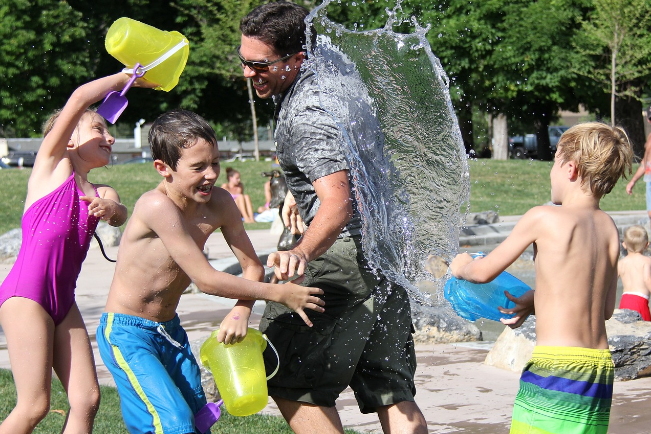“This is the hottest I’ve ever seen Alabama,” said the TV meteorologist, who was sweating so badly his white shirt looked like a Ziplock bag. “I’ve never seen temperatures this high.”
If you haven’t heard, a dangerous Alabama heatwave is currently affecting the Southeast. The National Weather Service just reported that the heat index is likely to reach 117 degrees before the end of this column. Maybe even higher. It’s so hot the Jehovah’s Witnesses in my neighborhood have started telemarketing.
“By the Fourth of July,” the National Weather Service reported, “the ‘feels-like’ temperature is going to reach, approximately, Satan.”
I am originally from the Florida Panhandle. Growing up, we had summers that were so hot that whenever dogs chased cats, they both walked. But this is a new level of heat. This is existential heat.
A few days ago—this is true—I was walking into Publix to buy groceries. As I was staggering through the parking lot, I noticed a Nissan Altima with cookies baking on the hood. Chocolate chip.
I saw the owner stepping into her car, wrestling with her seatbelt, which was so scaldingly hot it qualified as a branding iron.
“Are those really cookies baking on your hood?” I asked.
“They’re gluten-free,” she said. “My 9-year-old daughter is allergic to gluten.”
I met another woman in the supermarket who is originally from Cullman, Alabama. “This is nothing,” she said. “One time, my neighbors put up a privacy fence made out of PVC, the thing melted. Now it looks like he has a privacy wall of Play-Doh.”
The heat is no joking matter. Today, the temperature gauge on my dashboard read 116 degrees.
“You kind of get used to the heat,” said longtime Alabama resident Randy Marks. “I’ve been living in Birmingham since I was a baby. I remember one time my mom bought a dozen eggs, and when she got home, there were 12 baby chicks in the carton.”
The entire region has been succumbing to deadly heat this week. There have been 11 heat-related deaths in the Southeast recently. On Tuesday, a postal worker collapsed and died while on his route in Dallas.
According to the U.S. Postal Service, while going door to door during the high temperatures, Eugene Gates Jr. collapsed in a front yard before a homeowner. The homeowners came outside and tried to perform CPR, but it was too late. He was gone.
The New York Times reported recently that at least 270 UPS and U.S. Postal Service drivers have been sickened or hospitalized due to heat exposure in the past decade.
Linda, of Hoover, Alabama, almost lost a pet to heat stroke this year. She was on a walk with her husband and their dog Floyd at 7 in the evening. Her dog started panting excessively, then he started vomiting. She was busy checking on her dog when she noticed that her husband was also vomiting in the other room.
“Quit lollygagging, you idiot!” Linda shouted to her husband, “Get out here and help me with the dog!”
A few hours later, they were in the emergency room where her husband was hooked up to an IV drip, clinging to life.
“I would have never called him an idiot if I’d known he was suffering heatstroke,” said Linda. “Thankfully,” she added, “the dog is okay.
Marie-Carmelle Elie, M.D., chair of the Department of Emergency Medicine in the UAB Marnix E. Heersink School of Medicine, says heat illness can be a fatal condition.
“The body uses sweating to cool itself,” she says, “but with extreme temperatures, high humidity, body temperature can rise to dangerous levels. Older adults, children, and those with preexisting conditions are at highest risk; but anyone can develop heat-related illnesses under the right conditions.”
Even so, the advice on how to deal with heatstroke is hit-or-miss. No two medical experts seem to agree on the correct way to treat heat exhaustion.
“The best thing to do,” one expert says, is to “reduce the person’s temperature with cool cloths or an ice bath, but do not—I repeat—DO NOT give fluids, or you will be looking at a corpse. Excess fluids flush vital nutrients and deplete electrolytes.”
And yet another expert I interviewed says, “Move the victim to a cool location, have them lie down, loosen their clothing, make them drink lots of Gatorade. Call 911. If that doesn’t work, get a priest.”
But it was the meteorologist on TV who gave the best advice.
“If you want to know how to deal with this heat,” he told viewers, “move somewhere cooler, like Phoenix. Or Hell.”
Or at the very least bake some cookies.
Sean Dietrich is a columnist and novelist known for his commentary on life in the American South. He has authored nine books and is the creator of the “Sean of the South” blog and podcast. The views and opinions expressed here are those of the author and do not necessarily reflect the policy or position of 1819 News. To comment, please send an email with your name and contact information to Commentary@1819News.com.
Don’t miss out! Subscribe to our newsletter and get our top stories every weekday morning.










